Where are the electric convertibles?
It’s once again time for summer cruises and drive-in movies, segueing into the time when crisp autumn air and colorful leafy backroads beckon, when family members enviously ply the auto market, pondering the possibility of a convertible.
And to get with the times, that often includes a look at whether that open-air delight might be an EV.
Once again there isn’t a single factory-made electric convertible offered in the U.S., and the best option for those who must have one now is likely a specialty conversion shop. Nor is there a single hybrid convertible or plug-in hybrid that might allow you to cruise along the length of a beachside strip and just take in the people and the sound of the surf.
Hyundai Motor Group E-GMP platform
EV packaging is part of it
Building a from-scratch electric convertible or roadster is especially challenging.
That’s because the future of electric vehicle production rests largely on so-called skateboard platforms—including the Hyundai Group’s E-GMP, for instance, or GM’s Ultium tech—that package a flat battery pack under the floor and between the axles. That allows different “top hats” to be designed and engineered over the skateboard with a minimum of changes.
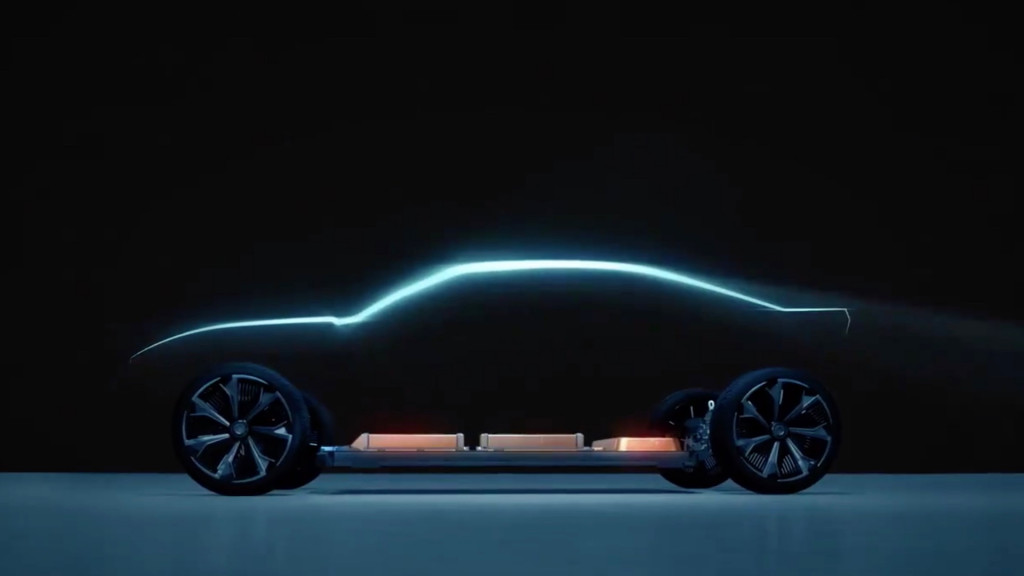
Possible electric Chevrolet Camaro in GM Ultium teaser video
But sedans are challenging, and coupes and convertibles are even more daunting—simply because it’s hard to engineer a satisfying roadster or sport-sedan shape with several inches of the floor height dedicated to the battery pack down below.
For that reason, industry insiders have suggested Green Car Reports that convertibles built on a legacy internal-combustion platform—or taking a non-skateboard approach—might actually be more likely for production, simply because they would overcome that dimensional challenge of squeezing a battery pack under all the floor.
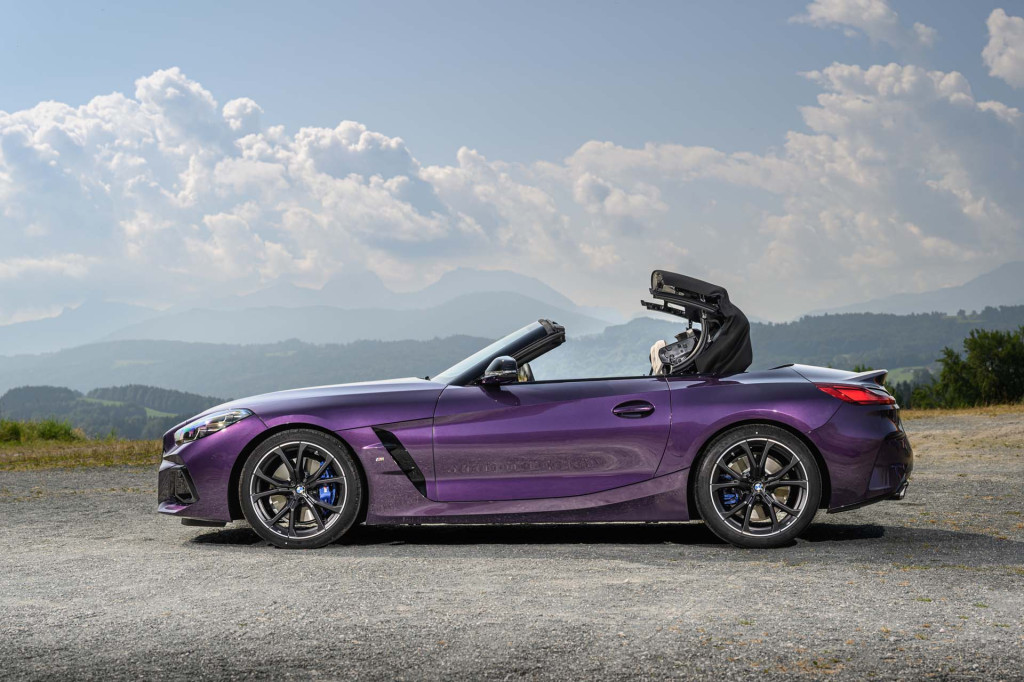
2023 BMW Z4
Weight and safety are other challenges
Crash-test hurdles are also higher for convertibles as it is, because they require portions of the car’s body structure other than the roof to bear more of the collision forces. Automakers in the 1990s and 2000s, when roadster popularity surged, came up with innovative safety tech to help shield occupants—pyrotechnic rollover hoops, for instance.
But in an era of electric vehicles all of that hardware would need to be proven out for vehicles with much more weight thrown into the mix. Convertibles already tend to be heavier than coupes; add a hefty EV battery pack into the mix and the effect can be compounded.
Further, all this extra engineering—for a vehicle with limited appeal—costs a lot of extra money.
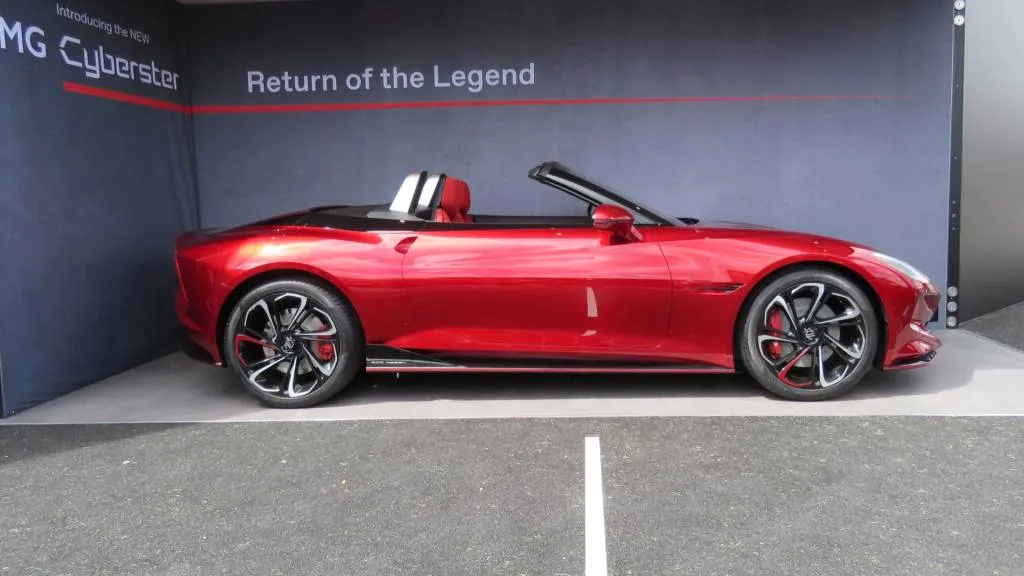
MG Cyberster. – Goodwood Festival of Speed
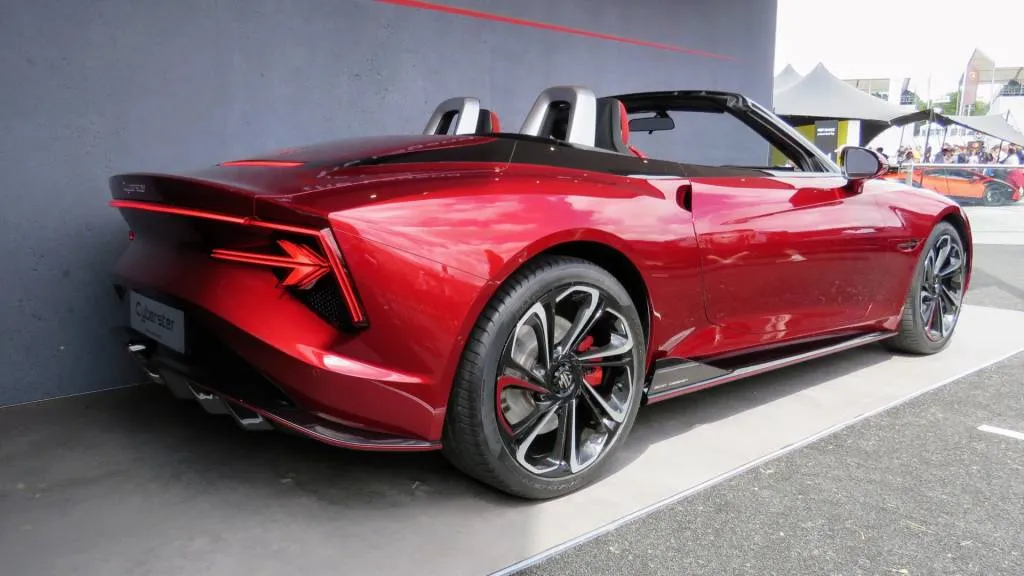
MG Cyberster. – Goodwood Festival of Speed
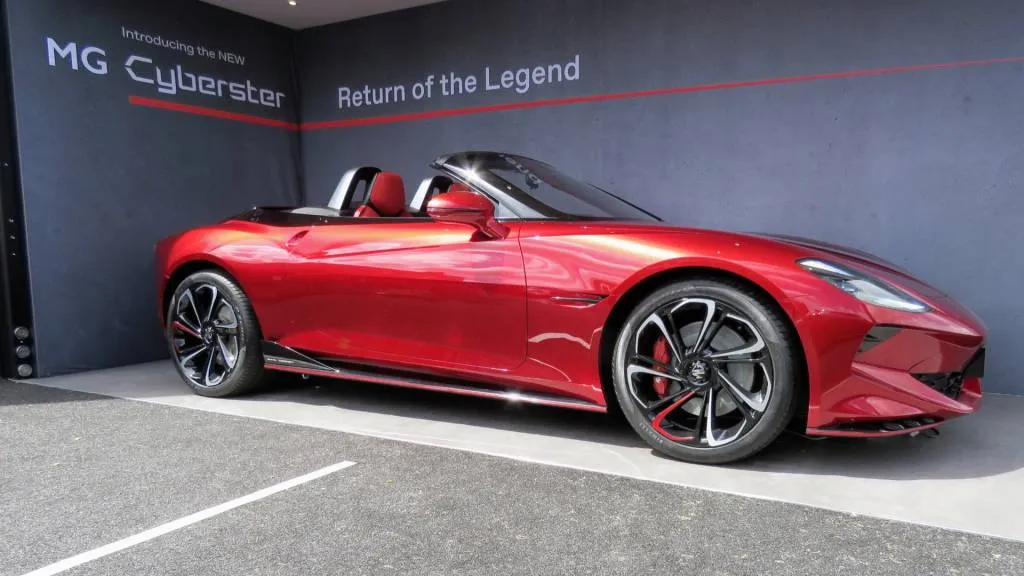
MG Cyberster. – Goodwood Festival of Speed
MG Cyberster: Leading edge of electric roadster 2.0?
With the Tesla Roadster 2.0 long overdue and likely starting around $200,000, the closest to a no-frills production convertible sports car is the upcoming MG Cyberster.
The MG Cyberster is about two feet longer than the MX-5 Miata. Since the Cyberster is packing a base 64-kwh battery pack and tops 4,000 pounds even in single-motor rear-wheel-drive form, it weighs around 1,700 pounds more than the U.S.-spec 2023 Mazda MX-5 Miata—or about as much as two original 1960s-era MGB roadsters.
Up close at last month’s Goodwood Festival of Speed, it impressed more as an electric equivalent to the gasoline Jaguar F-Type convertible than to those smallest roadsters.
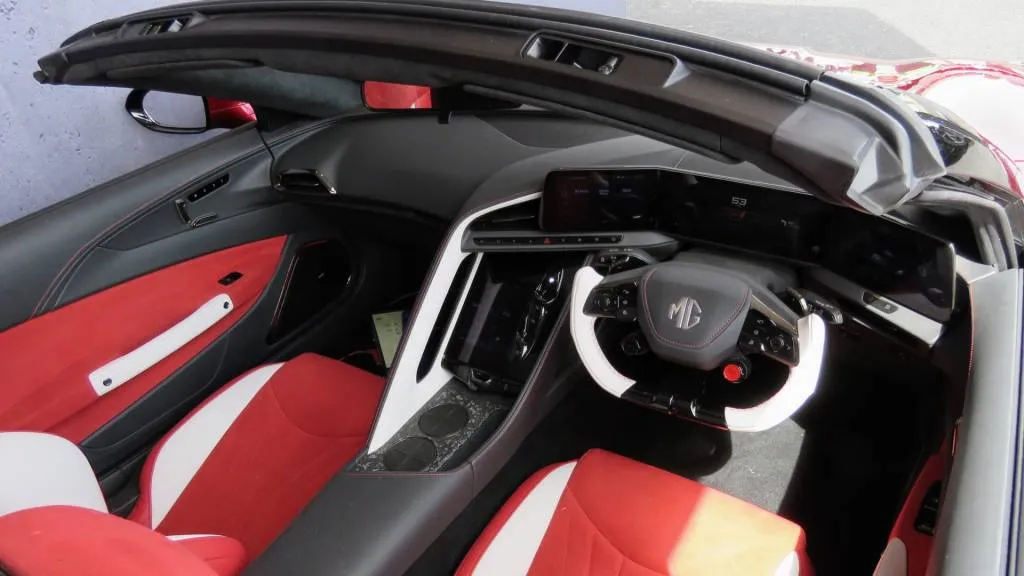
MG Cyberster. – Goodwood Festival of Speed
The Cyberster won’t likely be U.S.-bound, though. MG recently told Green Car Reports that “there is no definitive answer” on whether the Cyberster might come to the U.S. eventually. For now, plans are limited to U.K., Europe, Australia, and markets in Asia. The Cyberster was engineered in China by owner SAIC and will be built in Shanghai, although there was a lot of input from MG’s Marylebone, England, design team and there will be some local chassis-tuning input.
And with a starting price just above 50,000 British pounds (around $64,000), it won’t exactly be cheap either, but it might potentially bring a new segment to life.
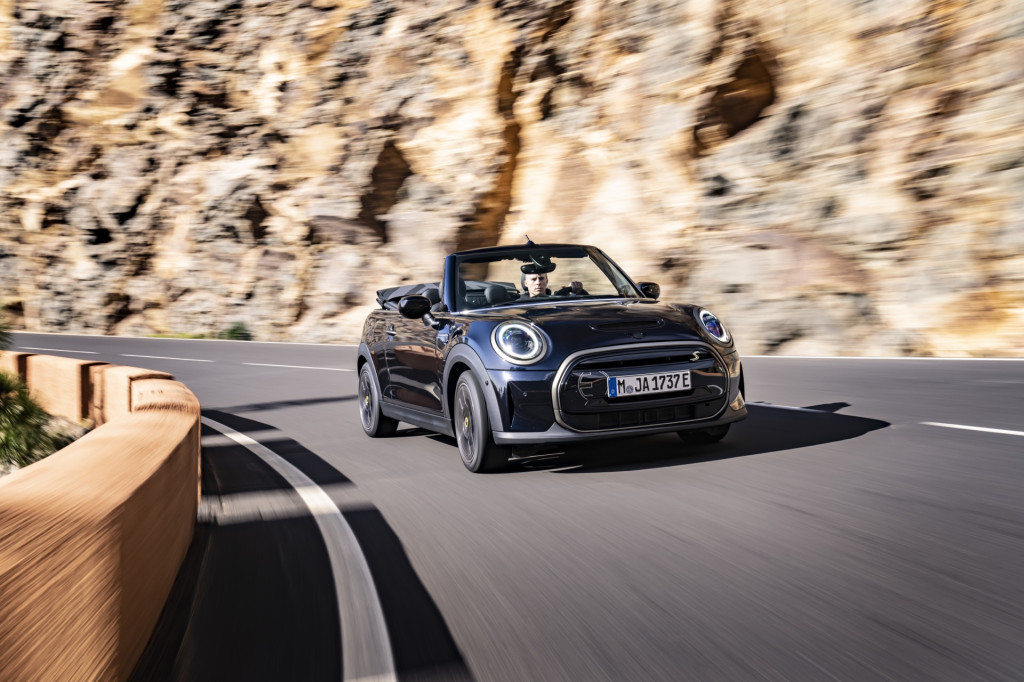
MINI Cooper SE Convertible (Euro spec)
Future electric convertibles: A mirage at the moment
If you’re in Europe, there are a few options now, or very soon. A Mini Cooper SE Convertible is now a production reality—in a very limited run of 999 vehicle—and Fiat is offering a convertible (fold-back-roof) version of the electric 500, called the 500C.
In the U.S., it’s going to take a bit longer and even on automakers’ future product plans EVs that fit the convertible form in any way are a rare breed. Examples of fully electric sports-car models set to arrive in the next several years include the Polestar 6 and a Porsche 718 EV—in addition to a number of very exclusive electric supercars.
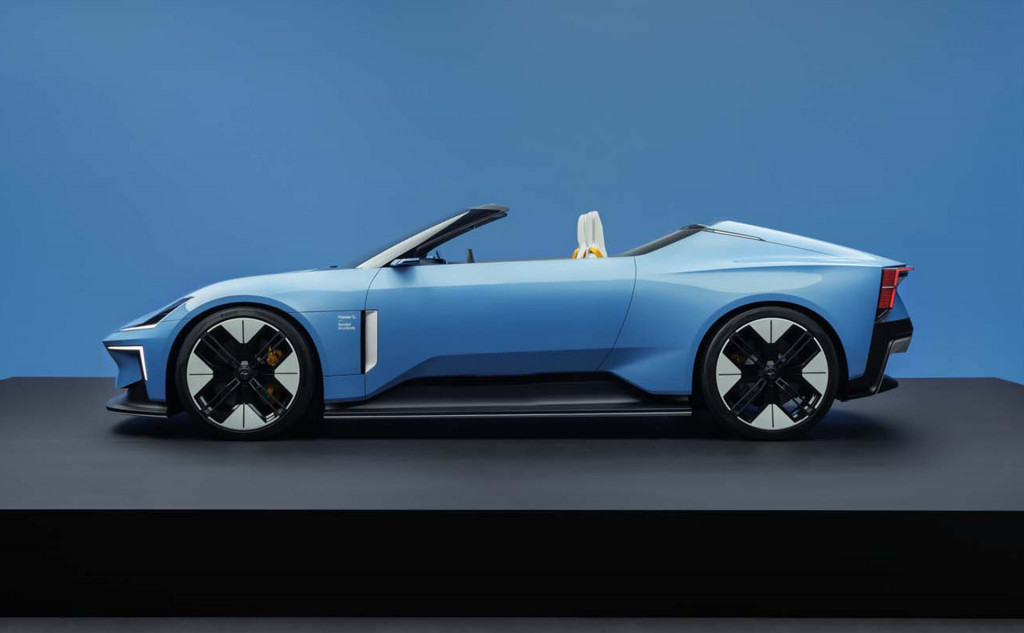
Polestar O2 concept
In the high-priced luxury market, the Fisker Ronin due in a couple years might allow an open-air electric driving experience. Genesis has considered the idea of an electric drop-top with its X Convertible Concept from 2022. And Rolls-Royce has hinted that a Spectre convertible is a distinct possibility.
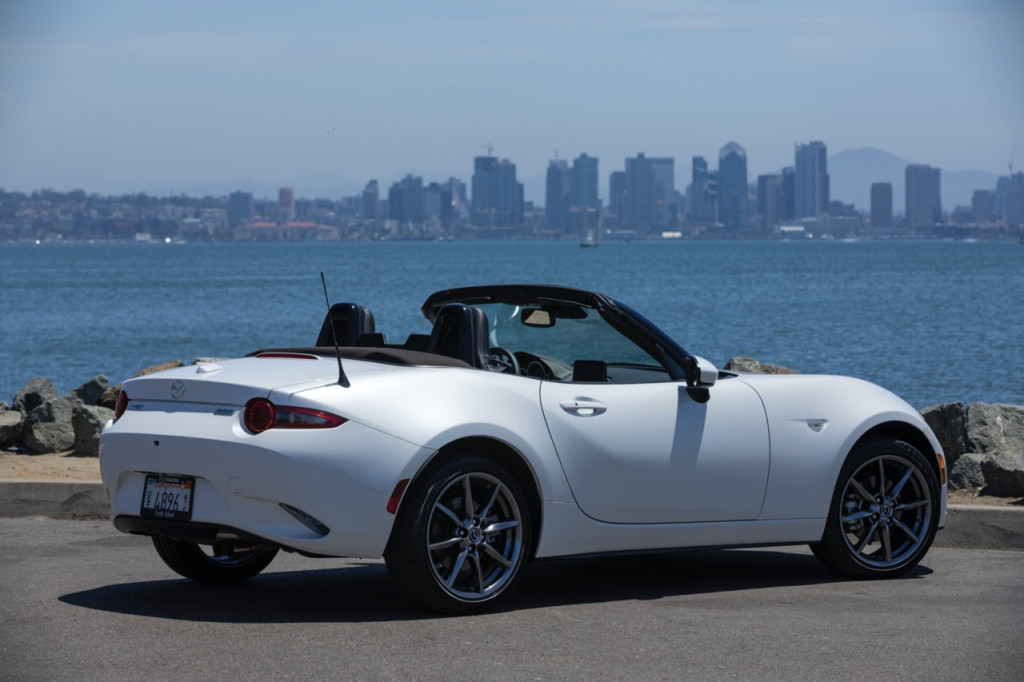
2023 Mazda MX-5 Miata
This all still leaves the idea of a light-and-lean electric convertible on the table. At the time the current generation of the MX-5 Miata arrived, Green Car Reports pondered whether it’s the greenest new sports car. Looking ahead, Mazda first confirmed in 2021 that the next MX-5 Miata will have some form of electrification, and since then it hasn’t offered many, if any, hints of which powertrain a production version might have.
A fully electric version is probably the least likely. Perhaps with a small rotary range extender plus enough battery for a commute or backroad blast, Mazda could provide a check-all-the-boxes sports car where dropping the top keeps it simple.
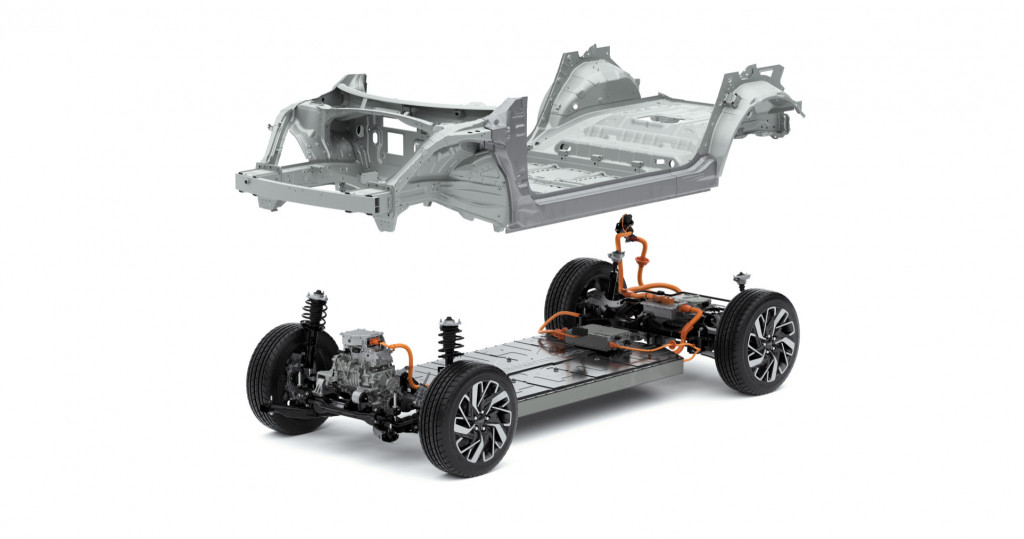
lasuna brand – diarex canada himcolin for sale
buy besifloxacin online – carbocisteine where to buy cost sildamax
order benemid 500mg – buy probenecid 500mg generic carbamazepine cost
celecoxib 200mg drug – indocin medication purchase indocin generic
buy voltaren – order aspirin generic aspirin pill
rumalaya price – buy generic elavil 10mg endep pills
purchase pyridostigmine – oral mestinon 60 mg order azathioprine 25mg online cheap
cheap diclofenac generic – cost nimodipine where to buy nimotop without a prescription
oral ozobax – ozobax usa order feldene 20 mg for sale
order mobic 7.5mg – buy generic maxalt order toradol 10mg online
buy cyproheptadine 4 mg generic – buy generic tizanidine 2mg tizanidine 2mg uk
cheap omnicef 300mg – cleocin for sale generic cleocin
order accutane pill – buy dapsone without a prescription deltasone 10mg usa
prednisone 5mg sale – buy deltasone pills order elimite without prescription
acticin ca – acticin medication retin cream generic
betamethasone online buy – betamethasone 20gm brand monobenzone brand
flagyl 400mg uk – buy flagyl generic cenforce generic
amoxiclav pills – augmentin 1000mg brand levothroid brand
purchase cleocin without prescription – order cleocin 150mg sale buy indomethacin 75mg online cheap
hyzaar pills – buy losartan paypal brand cephalexin 250mg
buy eurax cream – cheap aczone aczone pills
provigil drug – buy promethazine online meloset for sale online
oral zyban 150 mg – purchase zyban online cheap shuddha guggulu online
purchase xeloda online cheap – mefenamic acid brand danocrine cheap
order norethindrone 5 mg online – order lumigan eye drops yasmin usa
order generic estradiol – order ginette 35 pills purchase anastrozole generic
バイアグラ её‚иІ© гЃЉгЃ™гЃ™г‚Ѓ – バイアグラ通販 安全 г‚·г‚ўгѓЄг‚№гЃЇи–¬е±ЂгЃ§иІ·гЃ€г‚‹пјџ